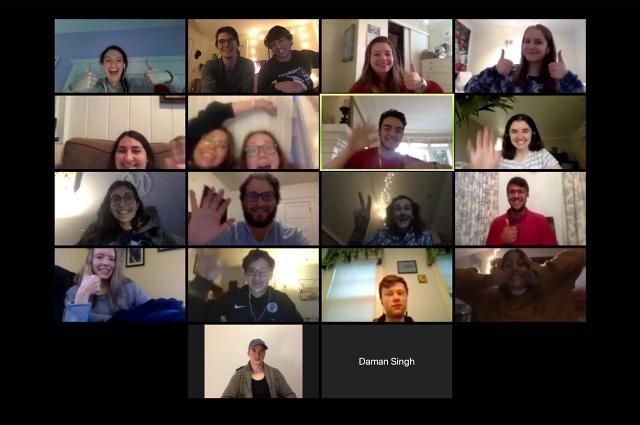Searching for Human Purpose in Film

Students participated in weekly Zoom discussions after courses moved online.
The meaning of life, a defining topic of existentialism, may be one of the most daunting questions that exists, but Tufts students are tackling it through cinema. Existentialism is a philosophical approach that emphasizes the existence of the individual person who determines their own development through acts of free will, and it is what the course Film, Philosophy, and the Search for Meaning centered on this semester. Alma Avalle and Siddharth Jejurikar, both Class of 2020, revealed how the search for human purpose is explored through film.
Alma and Siddharth were roommates throughout most of their time at Tufts. Over the past four years, Alma – who majors in English and Economics – grew increasingly interested in classic, independent, and international film, especially cinema involved in countercultural movements that carry heavy existentialist questions and themes. Siddharth, who majors in Philosophy and International Relations, realized his passion for the field in high school while studying existentialist literature. Bonded by art criticism, the two decided to teach the course together.
Avalle explains:
“When senior year came around, both of us were looking for a capstone project of sorts to tie up our college experience and synthesize our shared passion for film and philosophy. A class where we could pass it along to others seemed like a perfect experience, only possible through the ExCollege.”
Film, Philosophy, and the Search for Meaning was not just an exploration of existentialism through the cinematic lens, but a course about learning to use philosophy, movies, and other stories as tools to find and define meaning within our own lives. With topics such as humanism, war, scientific progress, nihilism, and the search for meaning – and screenings of Breathless, Eraserhead, 2001: A Space Odyssey, Taxi Driver, and Little Miss Sunshine – students could witness people finding their purpose and may be inspired to do the same.
To encourage participation, students were assigned to groups that each led two lectures throughout the semester. Discussion leaders formulated questions to facilitate conversations and debates. “We really wanted our students to play a role in guiding the course material,” Siddharth explains. “Existential questions are some of the most universally accessible in philosophy and considered by most people, in some form, at different points in their life. For this reason, we wanted to focus particularly on the questions of meaning, values, purpose, and God that affect and weigh on our students’ minds.”
Weekly film screenings were held at an on-campus theater with the purpose of emulating the at-the-movies experience directors often intended for their audiences. The open-ended final project acted as a platform for students to freely explore the ideas they were most interested in.
The shift to online classes posed some new challenges for Alma and Siddharth, but they were able to overhaul parts of their course to fit the new layout. “We decided to do a hybrid synchronous and asynchronous course structure,” Siddharth says. “This allowed us to still see our class once a week for a full discussion without asking them to spend too much time staring at a computer screen.” Students would watch pre-recorded lectures on Tuesdays, and they would attend class discussions over Zoom on Thursdays. The weekly assigned discussion leaders created Canvas forums for students to answer questions.
When asked what she hopes students will take away from her class, Alma replies, “Personally, I hope students walk away with a deeper understanding and love of cinema as an art form than what they arrived with. Beyond just a form of entertainment, I hope they begin to see movies as works of art capable of communicating great messages on philosophy and the human condition.”
Siddharth agrees that film is vital to exploring the abstract ideas of philosophy. “I want students to walk away from the class with an understanding of the historical context that makes existential ideation happen, both in the academy and in film, and realize that philosophy can rarely, if ever, exist in a vacuum divorced from human life,” he says. “As a result, pure theory is not always the best way to demonstrate ideas — literature, film, and interpretive art in general is a valuable tool for philosophical communication.”
For these reasons and more, the course came to see film as a platform for reflection and discovery.
About the Author
Kaycee Feldman is a first-year student planning to earn a double major in Astrophysics and Film & Media Studies. Hailing from the small town of Doylestown, Pennsylvania, just outside of Philadelphia, she is highly interested in both the arts and sciences and how they can overlap. When not writing for the ExCollege, she can instead be found writing science fiction and horror stories that she intends to convert into screenplays.